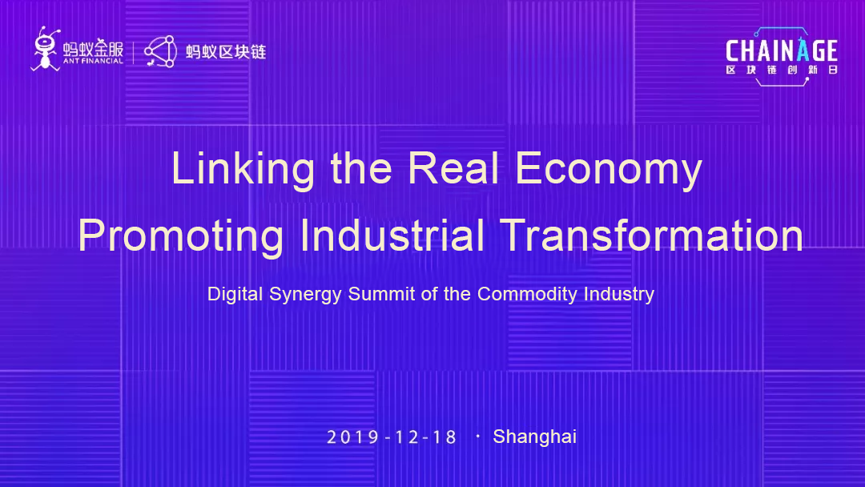
In today's ever-fluctuating digital economy, the commodity industry has become a bridge between the digital economy and the real economy, and to some extent has a direct effect on our daily lives. On December 18, 2019, we convened the Industry Digital Synergy Summit for Ant Blockchain Commodities in Shanghai to explore applications and innovations that blockchain can bring to the commodity industry and discuss the digital transformation of the commodity trading industry.
In the commodity trading industry, many shortcomings and redundancies exist in the transaction and circulation process due to the extensive business field and large number of member organizations. From upstream production enterprises through warehousing and logistics to trading companies, simple and clear trusted data is rare in the industry. In addition, fake trades, insider trading, business frauds, and other improper practices increase the risks in the market.
These problems have long resulted in financing difficulties and high financing costs for many private enterprises and also hinder the development of the commodity industry and the real economy. With the rapid development of blockchain, Internet of Things (IoT), artificial intelligence (AI), and other technologies, new innovations have made the ongoing industrial transformation an opportunity for the commodity trading industry to truly prosper.
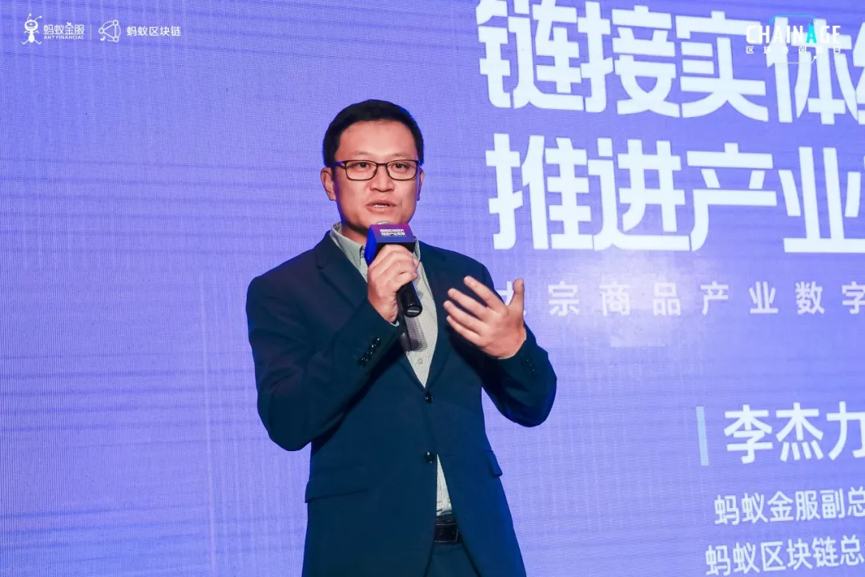
Li Jieli, General Manager of Ant Blockchain
It is widely believed that blockchain will achieve its first breakthroughs in fields such as commodities, trade, supply chains, and warehousing and logistics. In view of this forecast, Li Jieli, General Manager of Ant Blockchain, stated that blockchain will prove its value to the commodity trading industry in three ways.
First, because blockchain allows multi-party participation and is resistant to tampering, it can preserve the data and evidence of commodity transactions with greater accuracy and reliability. It will comprehensively boost in-depth improvements in product traceability and the preservation of judicial evidence.
Second, more reliable data will effectively promote commodity asset transactions and the circulation of materials used in production.
Third, by comprehensively upgrading the production, logistics, and finance processes involved in commodity transactions to trusted digital assets, blockchain will create new forms of assets. For example, it will completely transform futures trading.
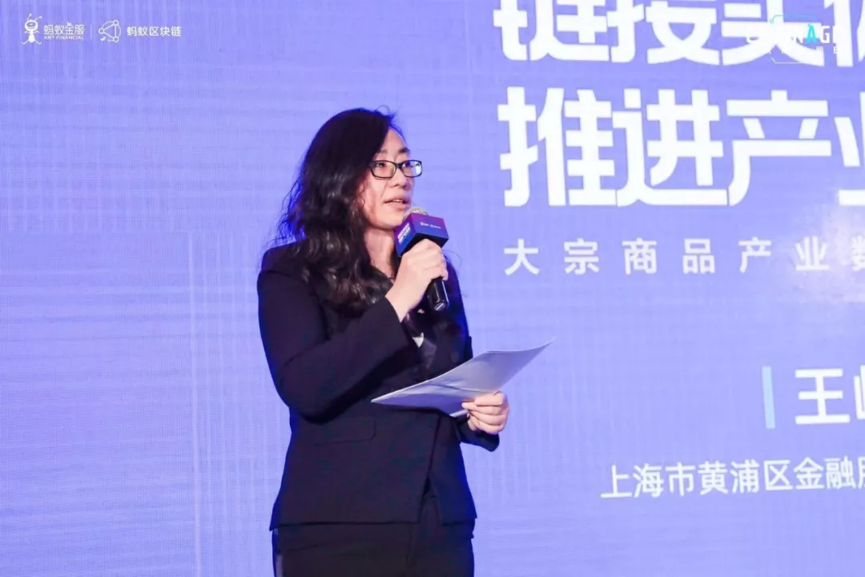
Wang Jun, Deputy Director of the Financial Services Office in Huangpu District, Shanghai
At this summit, Wang Jun, Deputy Director of the Financial Services Office in Huangpu District, Shanghai, analyzed the risks specific to the commodity trading industry in the digital economy era and the precious opportunities that should not be missed by the industry. She also provided an in-depth analysis of the practical significance of blockchain technology from the perspective of national strategy. She believes that, "to achieve a strategic understanding of the importance of blockchain development, for the nation and for individuals, we need to understand new-generation information technologies and innovative breakthroughs. Blockchain is one such important technology."
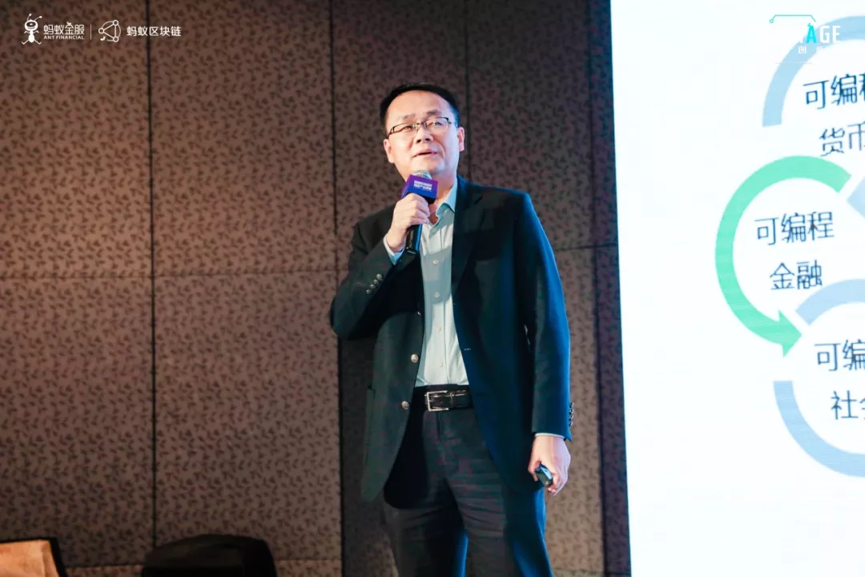
Zheng Shihui, CTO, International Energy Exchange, Shanghai Futures Exchange
As a hub that links the real economy and the financial industry, the value of the commodity industry will be redefined by the introduction of advanced technologies such as blockchain. Zheng Shihui, CTO of International Energy Exchange, Shanghai Futures Exchange expressed his opinions on this point. In his opinion, there are several principal needs of real enterprises:
The standard warehouse receipt solution plays an important role in meeting these needs. Compared with traditional warehousing, standard warehouse receipts allow transaction participants to ensure that goods are consistent with their warehouse receipts, guaranteeing the authenticity of the goods. At the same time, standard warehouse receipts prove that the real enterprises involved in the transaction have an authentic trade history and sound credit verified over a long period. In addition, as a credit intermediary, the standard warehouse receipt solution can effectively solve the problems for commodity circulation and transactions.
"However, when we try to use warehouse receipts in the outside world, the authenticity of warehouse receipts and the consistency between warehouse receipts and actual goods cannot be ensured. So, it is hard to ensure the correspondence of logistics and capital flows with information flows, which makes it difficult for enterprises to meet their financing needs. The traceable and tamper-proof features of blockchain technology allow us to track the flow of commodities and supervise the details of the entire process. As a result, blockchain provides an effective starting point for solving industry difficulties", said Mr. Zheng.
Asset standardization is the first step in overcoming the barriers to extending commodities trading outside the industry. By using blockchain technology, we can effectively identify and track each asset and match assets to funds. This will make asset digitization possible.
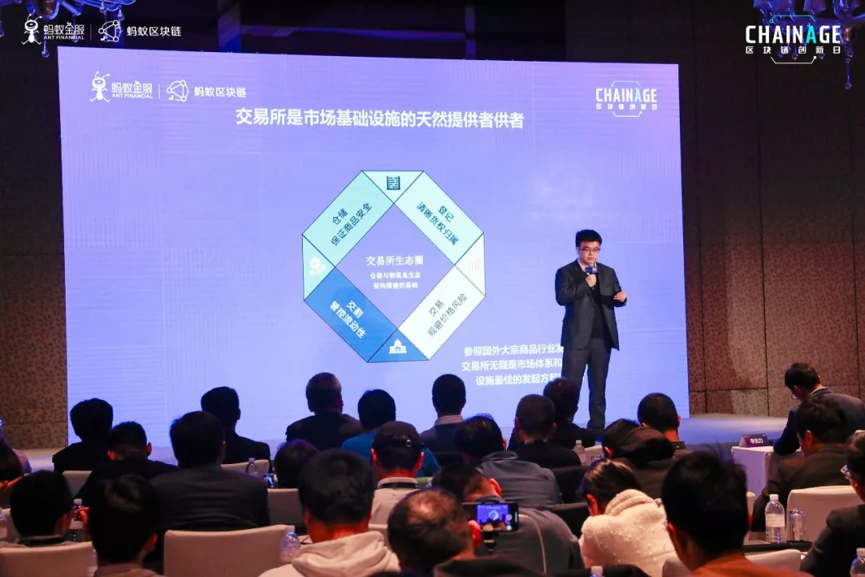
Dong Feng, General Manager of the Qianhai Mercantile Exchange
Dong Feng, General Manager of Qianhai Mercantile Exchange, said, "Exchanges are a natural provider of market infrastructure. Relying on blockchain technology, we can promote the transformation of the traditional centralized enterprise-based credit system into a decentralized credit system co-constructed by industry chain enterprises, warehouses, trading companies, banks, and insurance companies. This will allow us to build financial-grade standardized assets, effectively solve enterprise financing problems, and foster the high-quality development of the real economy."
Currently, the Qianhai Mercantile Exchange has set up a comprehensive electronic warehouse receipt system. With the power of technology and interconnected systems, we can visualize and trace the entire lifecycle of spot commodities and implement platform functions. This provides the infrastructure and public services that are urgent for building a standardized asset system for the real industry in a truly market-oriented manner.
While discussing the significance of blockchain warehouse receipts, Dong Feng remarked, "A trusted asset system based on blockchain warehouse receipts will help address the concerns that enterprises, especially SMEs and trading companies, have about the capital chain. It will enable enterprises to focus on technology R&D and product iteration and upgrades, which in turn, will improve the competitiveness of China's real manufacturing industry. This may become an important starting point and the first application scenario for industrial blockchain. As a result, it would create significant market value and its benefits would flow out to society as a whole."
Similarly, the Dalian Commodity Exchange has successfully implemented digital warehouse receipts. According to Jiang Wei, Director of the Market Development Department at the Dalian Commodity Exchange, in September of this year, the Dalian Commodity Exchange launched a graded trading platform and a membership system, which is essentially equivalent to a blockchain system. Jiang Wei believes that, if China can truly integrate blockchain technology with commodity transactions and corporate credit in the future, it will greatly reduce financing costs and industry-wide costs. Zhang Zhuoya, Deputy General Manager of Esunny, a subsidiary of the Zhengzhou Commodity Exchange, revealed that the Zhengzhou Commodity Exchange is studying the application of blockchain in futures and other fields. The commodity trading ecosystem involves different segments of the industry, including warehousing vendors, trading companies, exchanges, and banks. To build a reliable digital warehouse receipt system, it requires the collaboration of all types of enterprises, and the concerted efforts of industry associations and policymakers.
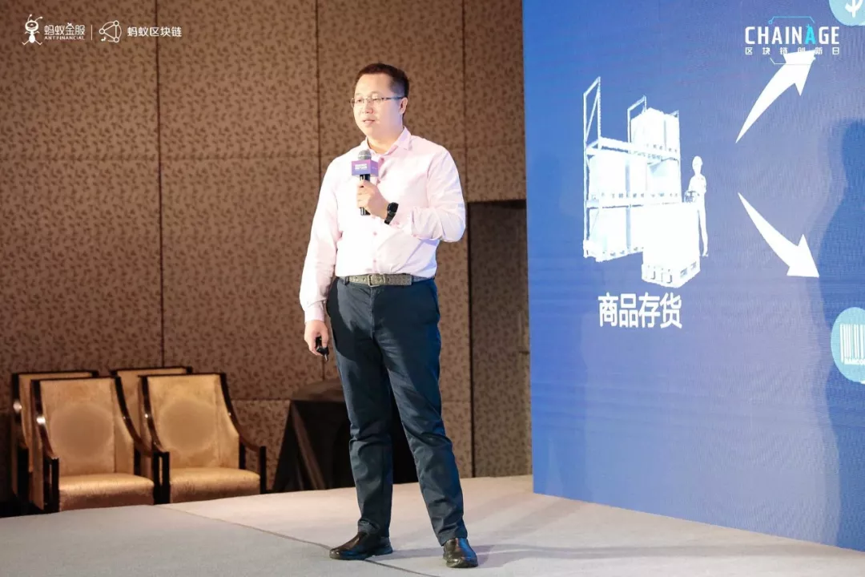
Ma Linghai, President of China Warehouse Association Warehouse Receipt Information Registration Service Co., Ltd.
Fortunately, Ma Linghai, President of China Warehouse Association Warehouse Receipt Information Registration Service Co., Ltd., revealed that, under the guidance of the four major banks, the China Warehouse Association will issue a system outline for governing the creation and registration of all warehouse receipts. They will formulate detailed implementation rules for different product types during the construction of the registration platform and provide corresponding technical services. Pilot projects have already been conducted at certain banks.
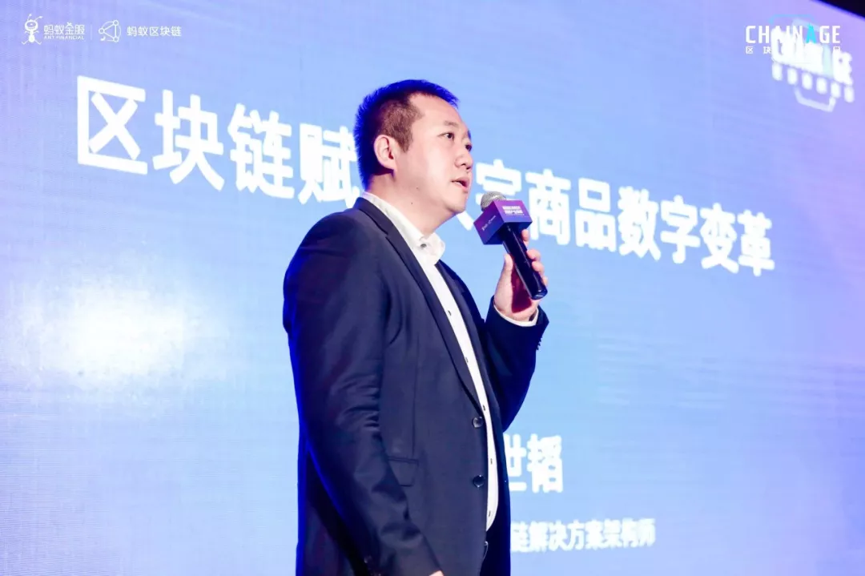
Ma Shitao, Chief Blockchain Solution Architect at Ant Financial
"A single chain can never be a network. To build an effective digital network for industrial collaboration, we must link many chains together", said Ma Shijun, Chief Blockchain Solution Architect at Ant Financial.
Looking at the commodity futures value chain, blockchain, and system planning, Ma Shitao discussed the technical aspects of the complete commodity warehouse receipt solution framework and product framework proposed by Ant Blockchain after over a year of research.
He expressed his hope that standardized digital assets could be formed on the blockchain, and in different business fields and industry alliances. In the future, on-chain digital assets should be able to interact with each other within and across blockchains. In this way, different alliances can cooperate to ensure the better, faster, and more efficient circulation of value, significantly reducing the high costs of industry collaboration.
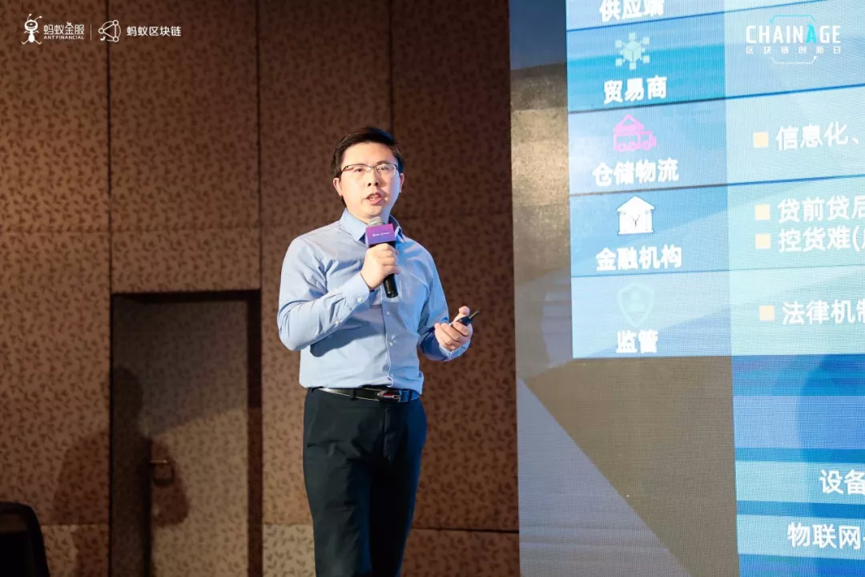
Peng Yujun, Blockchain Product Director at Ant Financial
Peng Yujun, Blockchain Product Director at Ant Financial, announced Ant Blockchain's specific service content and product details concerning blockchain-based warehouse receipts for commodities. In addition, he expressed his hope that blockchain technology can be supported by IoT, AI, and other technologies to drive business model innovation and implement warehouse receipt circulation and monetization.
He said, "We have set up warehouse receipt alliances for different industries, covering warehousing, trading, exchanges, and banks, but these systems remain isolated. Ultimately, we hope that these warehouse receipt alliances can form a truly collaborative network."
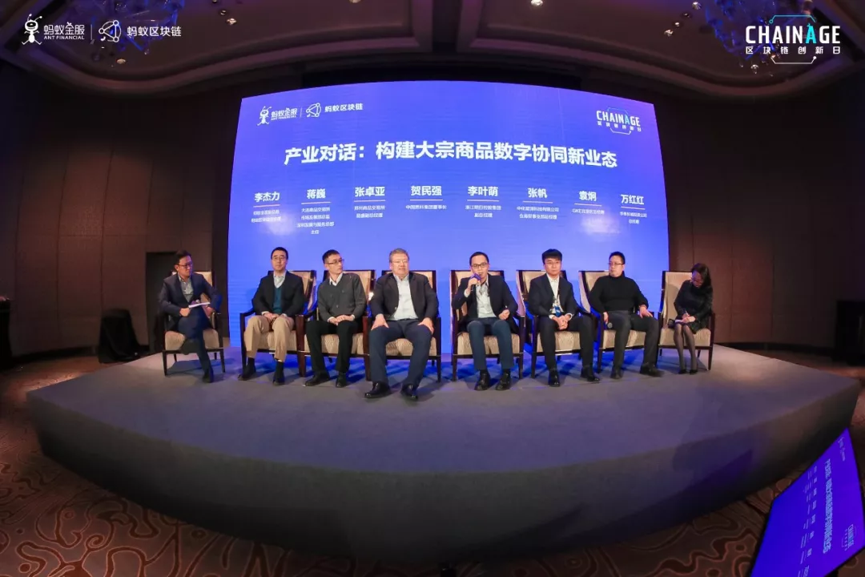
During the final round-table dialog of the summit, commodity exchanges represented by the Dalian Commodity Exchange and Zhengzhou Commodity Exchange, industrial customers represented by China Fuel Group and Sinochem Energy Technology, trading companies represented by Zhejiang Mingri Holdings Group and Huatai Great Wall Investment Management, warehousing enterprises represented by GEK, and other industry colleagues spoke with each other. They discussed the future development of commodity blockchain from the perspective of exchanges, suppliers, and investors, and shared their expectations and visions. The brainstorming that went on during this round-table forum gave new impetus to and created new possibilities for the integration of blockchain technology and commodities.
Jiang Wei, Director of the Market Development Department at the Dalian Commodity Exchange, pointed out the necessity of blockchain development. "Blockchain technology will greatly reduce financing costs and other costs across the entire industry. Of course, the process may affect certain interests. However, it is inevitable from the perspective of social progress."
Zhang Zhuoya, Deputy General Manager of Esunny, said, "In the future, blockchain will increase the openness of the whole industry. Through data sharing based on an open architecture, we can build more trust. Finally, we must integrate intelligent technologies to make the industry intelligent."
He Minqiang, Chairman of China Fuel Group, stated, "Internet technologies have developed well in the consumer field. If these technologies can be effectively applied in the industry, China will inevitably become a world leader in this field. In fact, I hope to use the real economy as a means. Only a strong real economy can lay a foundation for the strength of the whole country and ensure its position in the world."
Yuan Jiong, General Manager for North Asia at GKE, also expressed his hopes for blockchain. "If Ant Financial uses blockchain technology to remove the need for financial institutions and investors to provide funding with the endorsements of CITIC or large state-owned enterprises, that is, provide funding through the technology itself based on the goods but not the applicants , blockchain would have proved its critical importance."
Industrial collaboration will focus on commodity transactions. Zhang Fan, General Manager of the Canghaibang Division at Sinochem Energy Technology, proposed that the industrial internet has entered the second half of its development, and, at present, multi-party collaboration is needed the most to transform the industry. "We hope to make business in the petrochemical industry simple and efficient."
Li Yemeng, Deputy General Manager of Zhejiang Mingri Holdings Group, also mentioned the importance of industrial informatization. "In terms of enterprise digitization, we are still contained in internal informatization. The essence of blockchain technology is an increase in assets, which allows more people to collaborate and prove their value."
"Blockchain-based credit information can accelerate the circulation of commodities, which is of great significance to the commodity trading ecosystem", explained Wan Honghong, General Manager of Huatai Great Wall Investment Management.
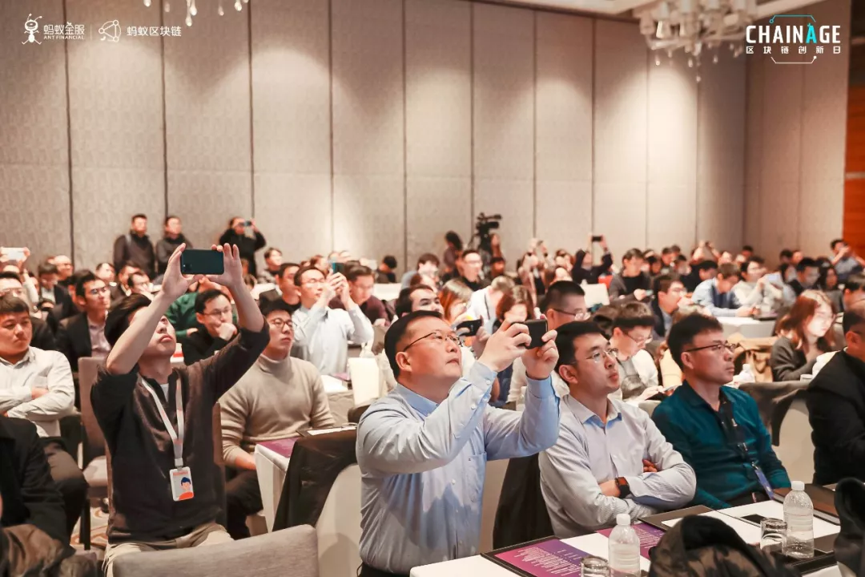
As a pioneer in blockchain technology, Ant Financial has been committed to building a new trust-based society characterized by the interconnection of thousands of chains and free circulation of digital assets. Therefore, over the years, we have worked with industries, such as supply chain finance, pharmaceutical tracing, electronic licenses, cross-border transactions, judicial institutions, logistics, and commodities, to foster deep cooperation across fields. We have been striving to use the strength of technological innovation to empower industries and benefit our society as a whole.
Download the Big Data and Blockchain: Innovative Fintech in the Cloud whitepaper to learn about Alibaba Cloud's technological innovation in financial services and how it is driving transformation in the Fintech sector.
Ant Blockchain in Finance: Helping Small Businesses Obtain Funds through Microfinance

15 posts | 8 followers
FollowAlibaba Clouder - July 23, 2021
Alibaba Clouder - September 26, 2018
Alibaba Clouder - September 28, 2020
Alibaba Clouder - June 24, 2020
Alibaba Cloud Community - May 30, 2022
Alibaba Cloud Community - July 6, 2022

15 posts | 8 followers
Follow Financial Services Solutions
Financial Services Solutions
Alibaba Cloud equips financial services providers with professional solutions with high scalability and high availability features.
Learn More FinTech on Cloud Solution
FinTech on Cloud Solution
This solution enables FinTech companies to run workloads on the cloud, bringing greater customer satisfaction with lower latency and higher scalability.
Learn More LedgerDB
LedgerDB
A ledger database that provides powerful data audit capabilities.
Learn More SOFAStack™
SOFAStack™
A one-stop, cloud-native platform that allows financial enterprises to develop and maintain highly available applications that use a distributed architecture.
Learn MoreMore Posts by Alibaba Cloud Blockchain Service Team